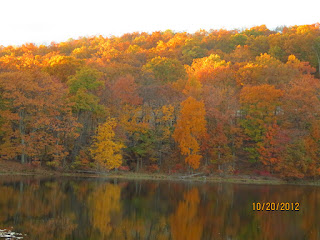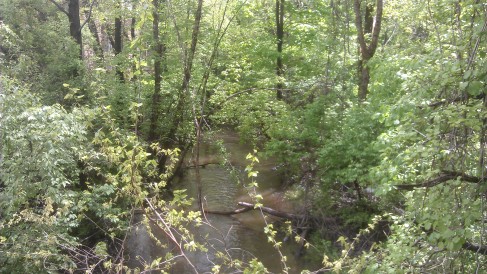I wrote in my previous post about bees; that I haven't seen them for a long time here. That I miss them during my walks. Not that I step out expectantly; to see the birds, the bees or the butterflies. When I go for a walk, I only want a few moments for myself. To gather my elements together. To set my spirit free, while the elements of nature stand witness. To engage in some meaningful conversation with my self. But after walking for sometime, I start missing the smells of earth, of grass, and the buzzing of bees. That's when my rational self kicks in and announces the presence of chemicals everywhere. 'So, how will you ever find a bee or a beetle?' 'Uhum', I sigh.
Last evening I was in a beautiful backyard in Mahwah, lost in a maze of beautiful hydrangea bushes - purple, blue and white, vines of snow peas, bitter gourd, and long beans, beds of spinach- red and green, a humongous jasmine bush in full bloom- its vines spilling over the brim of the tall, brick-red pot and growing in every possible direction, egg plants, and what not. While we were talking, a deer came along visiting us in the sunny patch, and made a quick exit. I was overjoyed to see the number of bees in that garden. Numerous bees and butterflies. I asked our host about her usage of pesticides. She said, 'none'. I said, 'no wonder.' By then, the sun was retiring for the day, albeit reluctantly. After dinner, we said good bye and while opening their front door to step in to the lemon porch, I was astounded. The air; redolent with the smell of insects in flight, their wings brushing swiftly against each other, their swishing sounds, the swarming wasps trying to stick to the dimly lit lamps in the portico, all lending an aura of naturalness, something that I may not even find in rustic countrysides here. How beautiful, I thought, if we were to let Nature nurture. Weeds may spring up, the wriggly worms may have a whale of a time nibbling from our leaves and buds, but won't Nature have her own mechanisms to give every one their due?
This morning, we were all on High Line, Manhattan. The High Line is a public park built on an historic freight rail line elevated above the streets on Manhattan’s West Side. Right from the point where it begins, it amazed me to no small degree. I was really lost in the vibrancy of life on the High Line. Plants, bushes, small trees, vines, shrubs- all in full bloom, in the spring of their lives.
The beautiful backyard in Mahwah served as a prelude to whatever I saw, heard and felt in High Line. Bees abound. Butterflies on a roll. No saddening, thoughtless, chemical-fed lawns. The variety of plant life amazed me. I don't recollect spotting such wild beauty in any garden here. The unpredictability of Nature- that's what touched me the most- every step I took, I was greeted by a different bush, or a different grass head. Yes, there are grass heads in High Line, you will find a million of them, with their heads held high, some of them dancing endlessly in the summer breeze, some as tall as my three year old. Nature is left to her wildest best. And then, the bees; they wouldn't sit on one flower, for they seemed to be overwhelmed. We even found a big beetle, it's green outer pod reflecting a dozen shades, trying to find a new abode inside my mom's hair-bun! During those couple of hours on High Line, I thought I had met up with all the bees in Manhattan or even the state of NY probably, I felt so happy seeing them all together; busy bees making the most of the wild flowers, sipping honey from god knows how many types of flowers. And imagine, all this blooming, buzzing and fluttering happening right in Manhattan, a minute away from the Times Square.
To say, the least, I was on a high on the High Line. If more than 100,000 plants are planted in a mile of an old rail line right in the middle of a bustling metropolis, what else could happen, eh?




















